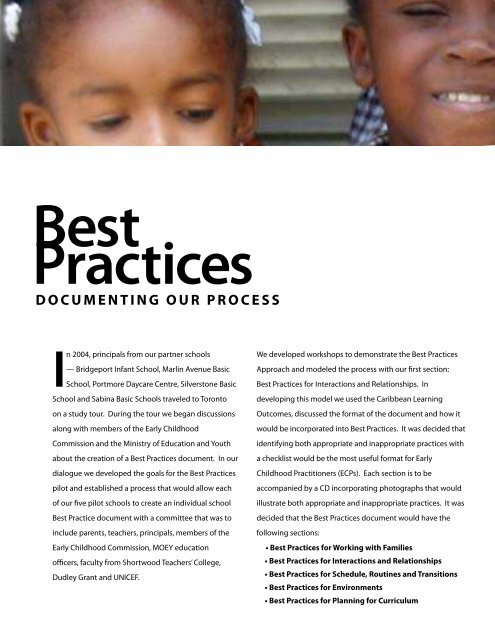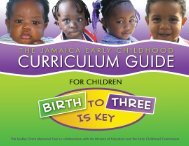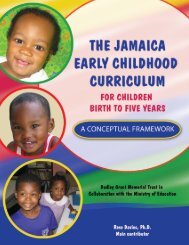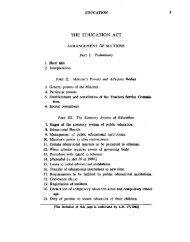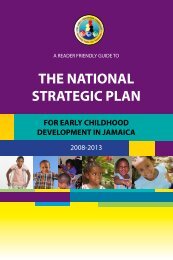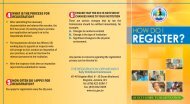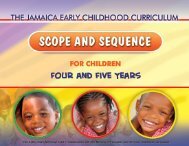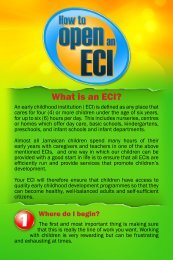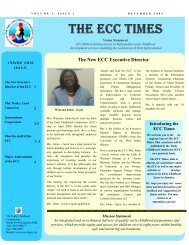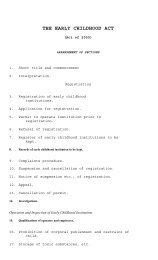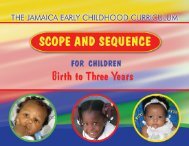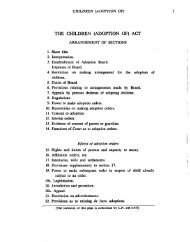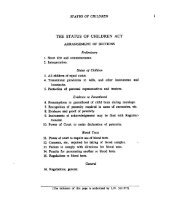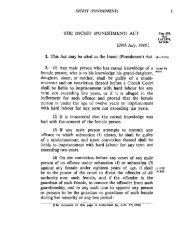Best Practices - The Early Childhood Commission
Best Practices - The Early Childhood Commission
Best Practices - The Early Childhood Commission
You also want an ePaper? Increase the reach of your titles
YUMPU automatically turns print PDFs into web optimized ePapers that Google loves.
<strong>Best</strong><br />
<strong>Practices</strong><br />
D O C U M E N T I N G O U R P R O C E S S<br />
In 2004, principals from our partner schools<br />
— Bridgeport Infant School, Marlin Avenue Basic<br />
School, Portmore Daycare Centre, Silverstone Basic<br />
School and Sabina Basic Schools traveled to Toronto<br />
on a study tour. During the tour we began discussions<br />
along with members of the <strong>Early</strong> <strong>Childhood</strong><br />
<strong>Commission</strong> and the Ministry of Education and Youth<br />
about the creation of a <strong>Best</strong> <strong>Practices</strong> document. In our<br />
dialogue we developed the goals for the <strong>Best</strong> <strong>Practices</strong><br />
pilot and established a process that would allow each<br />
of our five pilot schools to create an individual school<br />
<strong>Best</strong> Practice document with a committee that was to<br />
include parents, teachers, principals, members of the<br />
<strong>Early</strong> <strong>Childhood</strong> <strong>Commission</strong>, MOEY education<br />
officers, faculty from Shortwood Teachers’ College,<br />
Dudley Grant and UNICEF.<br />
We developed workshops to demonstrate the <strong>Best</strong> <strong>Practices</strong><br />
Approach and modeled the process with our first section:<br />
<strong>Best</strong> <strong>Practices</strong> for Interactions and Relationships. In<br />
developing this model we used the Caribbean Learning<br />
Outcomes, discussed the format of the document and how it<br />
would be incorporated into <strong>Best</strong> <strong>Practices</strong>. It was decided that<br />
identifying both appropriate and inappropriate practices with<br />
a checklist would be the most useful format for <strong>Early</strong><br />
<strong>Childhood</strong> Practitioners (ECPs). Each section is to be<br />
accompanied by a CD incorporating photographs that would<br />
illustrate both appropriate and inappropriate practices. It was<br />
decided that the <strong>Best</strong> <strong>Practices</strong> document would have the<br />
following sections:<br />
• <strong>Best</strong> <strong>Practices</strong> for Working with Families<br />
• <strong>Best</strong> <strong>Practices</strong> for Interactions and Relationships<br />
• <strong>Best</strong> <strong>Practices</strong> for Schedule, Routines and Transitions<br />
• <strong>Best</strong> <strong>Practices</strong> for Environments<br />
• <strong>Best</strong> <strong>Practices</strong> for Planning for Curriculum<br />
<strong>The</strong> stakeholders group also decided that two documents<br />
would be developed. One for children from Birth-3 years of<br />
age and the second for <strong>Early</strong> <strong>Childhood</strong> Practitioners working<br />
with children 3-5 years of age. At each meeting, schools<br />
brought their ideas forward and the format that is included<br />
here represents the collaboration of all 5 schools and key<br />
informants.<br />
It is hoped that this process can be replicated in other areas<br />
of the island and serves as a model for <strong>Best</strong> <strong>Practices</strong>. It can<br />
be used as a tool for discussions between practitioners, family<br />
members and principals to ensure quality experiences for<br />
children. Each practitioner who reviews this material will be<br />
involved in a process of reflective practice. This document<br />
provides standards that ensure quality and define exemplary<br />
practice. We see <strong>Best</strong> <strong>Practices</strong> as an on-going project.<br />
Responsive childcare is an active and evolving process.<br />
Changes are to be made as we recognize omissions, acquire<br />
new knowledge and invent new program strategies.<br />
Our document does not repeat or take the place of the <strong>Early</strong><br />
<strong>Childhood</strong> Act, Regulations and Standards for the operation<br />
of <strong>Early</strong> <strong>Childhood</strong> Institutions in Jamaica. This document<br />
should guide all of our programs.<br />
To quote “Start <strong>The</strong>m Right”:<br />
“<strong>The</strong> care that children receive in the first six to eight<br />
years of life will determine the adults that they will<br />
become. <strong>The</strong>se are the years when the foundation for<br />
growth and development; health and nutrition; physical,<br />
social, language, creative and cognitive abilities is laid.<br />
<strong>The</strong> experiences children have and the way in which they<br />
interact with their parents, family members, other adults<br />
and caregivers influence the way they learn and behave.”


